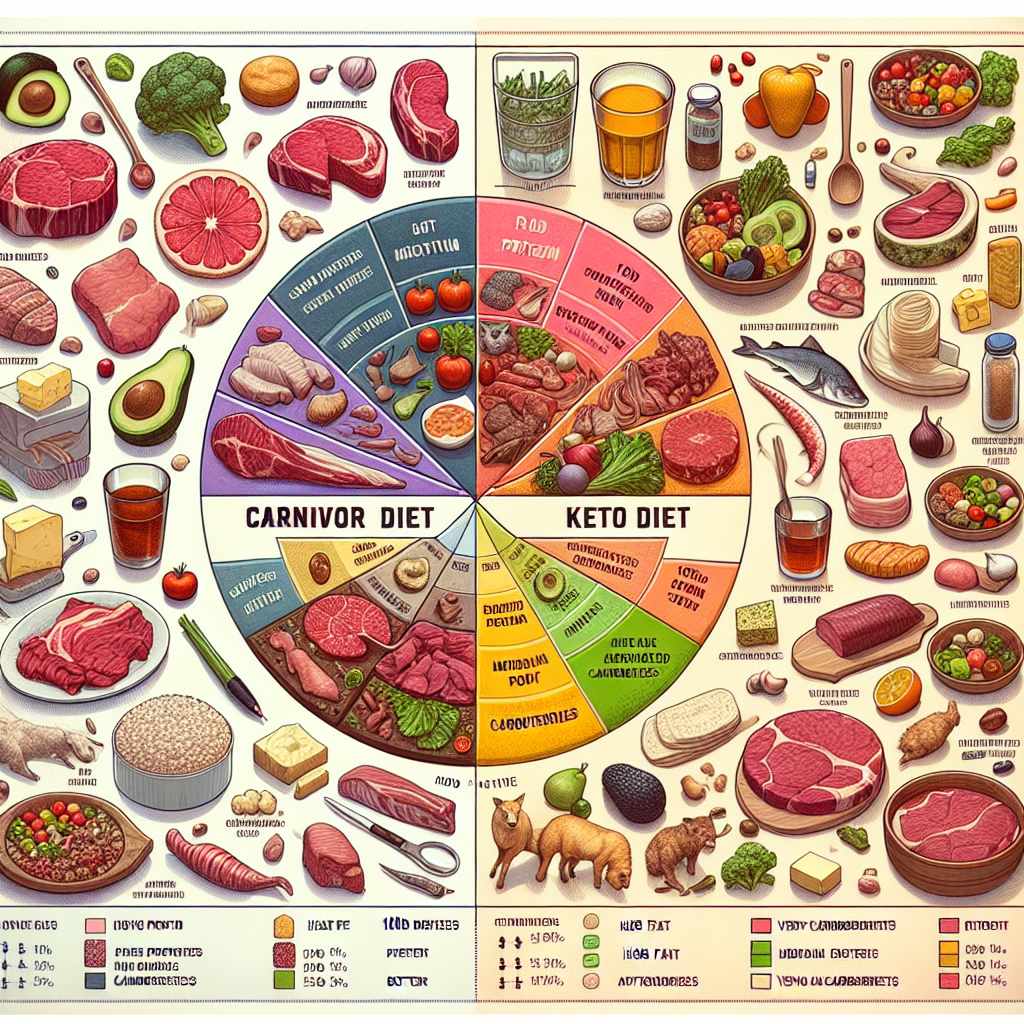

The Difference Between Keto and Carnivore Diets
1. Keto Diet (Ketogenic Diet):
• Composition: High fat (~70-80%), moderate protein (~15-25%), very low carbohydrates (~5-10%).
• Foods Allowed: Meat, fish, eggs, dairy, nuts, seeds, low-carb vegetables, and healthy fats (avocado, olive oil).
• Ketosis: The goal is to shift the body into ketosis, where it burns fat for fuel instead of carbohydrates.
• Fiber: Includes some fiber from low-carb vegetables, nuts, and seeds.
• Gut Microbiome Impact: Can support gut health if fiber and fermented foods are included.
2. Carnivore Diet:
• Composition: 100% animal-based; only meat, fish, eggs, and some dairy. No plant-based foods.
• Foods Allowed: Beef, pork, chicken, fish, organ meats, eggs, butter, and animal fats.
• Ketosis: Typically induces ketosis due to the absence of carbohydrates.
• Fiber: Zero fiber since all plant foods are excluded.
• Gut Microbiome Impact: May lead to gut dysbiosis due to the lack of fiber and plant-based prebiotics.
Which Diet Causes Dysbiosis?
Dysbiosis is an imbalance in the gut microbiome, often caused by poor diet, antibiotics, or stress.
Carnivore Diet:
• More likely to cause dysbiosis because it eliminates fiber and plant-based prebiotics that nourish beneficial gut bacteria.
• Can lead to reduced gut microbiome diversity, which may cause issues like constipation, inflammation, and weakened immunity.
• Some people experience diarrhea due to the gut adapting to high protein and fat digestion without fiber.
Keto Diet:
• If done properly with low-carb vegetables, nuts, and fermented foods, it can support gut health.
• However, a dirty keto diet (one that focuses only on meat, cheese, and processed fats) can also lead to dysbiosis.
How Important is Fiber?
Fiber is essential for gut health, digestion, and overall well-being.
Benefits of Fiber:
Feeds Good Bacteria (Prebiotic Effect): Fiber acts as food for gut bacteria, helping maintain a balanced microbiome.
Promotes Healthy Digestion: Prevents constipation by adding bulk to stool.
Reduces Inflammation: Fermentation of fiber produces short-chain fatty acids (SCFAs) like butyrate, which reduce gut and systemic inflammation.
Supports Metabolism & Blood Sugar Control: Slows glucose absorption, preventing spikes in blood sugar.
Improves Heart Health: Lowers LDL cholesterol and improves blood vessel function.
Aids in Detoxification: Helps bind and eliminate toxins, excess hormones, and waste from the body.
Conclusion:
• The keto diet can be gut-friendly if fiber is included.
• The carnivore diet lacks fiber and may cause dysbiosis, though some people tolerate it in the short term.
• Fiber is essential for a healthy gut, digestion, and overall wellness.
Relevant topic: How Vital Is Your Gut Microbiome

Leave a Reply